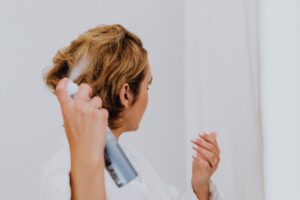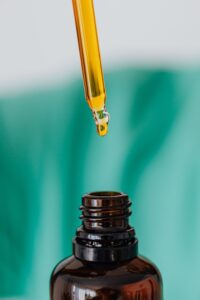Debunking Myths & Unveiling Benefits

Caffeine is commonly known as a natural stimulant that can give us the energy boost we need to start our day. However, did you know that caffeine can also benefit hair growth? In recent years, caffeine has become a popular ingredient in hair care products due to its potential to promote hair growth. But how much of this is fact and how much is fiction? In this blog post, we will separate fact from fiction and explore the benefits of caffeine for hair growth.
How Caffeine Affects Hair Growth at a Cellular Level
To understand how caffeine affects hair growth, we must first delve into the science behind it. Caffeine works by blocking the effects of a hormone called DHT (dihydrotestosterone), which can lead to hair loss. DHT binds to hair follicles and causes them to shrink, leading to thinner and weaker hair. By blocking DHT, caffeine can help maintain the size of hair follicles, which promotes healthy hair growth.
Moreover, caffeine also stimulates blood flow to the scalp, which provides the hair follicles with the nutrients they need to grow. This increased blood flow also removes waste products, such as DHT, from the scalp. As a result, the hair follicles are healthier and can produce stronger, thicker hair.
The Pros and Cons of Using Caffeine for Hair Growth
While the potential benefits of caffeine for hair growth are promising, it is important to consider the pros and cons of using caffeine for this purpose. One advantage of using caffeine for hair growth is that it is a natural ingredient that can be found in many hair care products. Unlike some chemical ingredients, caffeine is less likely to cause irritation or side effects.
However, it is important to note that the effectiveness of caffeine for hair growth varies among individuals. Some people may experience significant improvement in hair growth, while others may not notice any difference. Additionally, caffeine may not be effective for people with underlying medical conditions that cause hair loss, such as alopecia.
Another potential drawback of using caffeine for hair growth is that it may lead to dependency. Just like caffeine can be addictive when consumed as a beverage, some people may become dependent on caffeine in their hair care products. This can lead to overuse and potentially negative side effects, such as dry scalp or hair damage.

Incorporating Caffeine for Healthier Hair
If you are interested in incorporating caffeine into your routine for healthier hair, there are several products you can try. One option is to use a caffeine-infused shampoo or conditioner, which can help promote hair growth while cleansing and conditioning your hair.
Another option is to use a scalp treatment that contains caffeine, such as a hair serum or spray. These products can be applied directly to the scalp and left on overnight for maximum absorption. However, it is important to note that these products may not be suitable for people with sensitive skin or scalp conditions, such as eczema or psoriasis.
Finally, you can also try making your own caffeine hair mask using natural ingredients, such as coffee grounds and coconut oil. To make the mask, mix equal parts of coffee grounds and coconut oil and apply the mixture to your hair and scalp. Leave the mask on for 30 minutes to an hour before rinsing it off with warm water.
In conclusion, the benefits of caffeine for hair growth are not just a myth. The science behind it shows that caffeine can help block DHT and promote blood flow to the scalp, leading to healthier and stronger hair. However, it is important to weigh the pros and cons of using caffeine for hair growth and to consider individual factors, such as medical conditions and skin sensitivity.




